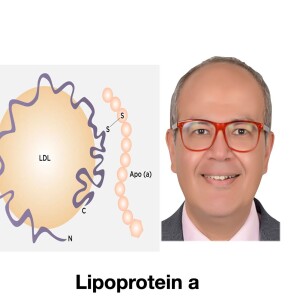
Monday Jan 02, 2023
Lipoprotein a
- Lipoprotein a is a molecule produced by the liver, similar to LDL in structure, with a peculiar protein that gives it wide variability.
- Elevated lipoprotein little (a) is causal of atherosclerotic disease, recurrent strokes, and aortic calcification. Smaller forms of LPa are riskier. LPa is not a risk factor for venous thromboembolism
- The levels are determined genetically with minimal impact from lifestyle.
- Normal values are <30mg/dL or <75 nmol/L) Elevated values are >50 mg/dL or >125 nmol/L)
- Levels should not be converted from mg to mmol or vice versa
- Levels should be measured once in the lifetime
- The excess risk of LPa elevation can be mitigated by additional LDL lowering and tighter CV risk factor control.
- PCSK9i(s) reduces the levels by 25%, but they are not approved for this indication.
- Aspirin may be beneficial as primary prevention in individuals with genetic variants that elevate LPa.
- Specific therapies are being developed to lower LPA by >70% and may be released three years from now.
No comments yet. Be the first to say something!